BMW i5 Touring vs Kia EV9 – Performance, range & efficiency compared
Both models have their strengths – but which one suits you more?
Compare performance, efficiency, price and space directly: BMW i5 Touring or Kia EV9?
Costs and Efficiency: When it comes to price and running costs, the biggest differences usually appear. This is often where you see which car fits your budget better in the long run.
Kia EV9 has a a bit advantage in terms of price – it starts at 53100 £, while the BMW i5 Touring costs 61900 £. That’s a price difference of around 8751 £.
In terms of energy consumption, the advantage goes to the BMW i5 Touring: with 15.40 kWh per 100 km, it’s evident more efficient than the Kia EV9 with 19.50 kWh. That’s a difference of about 4.10 kWh.
As for range, the BMW i5 Touring performs hardly perceptible better – achieving up to 602 km, about 39 km more than the Kia EV9.
Engine and Performance: Power, torque and acceleration are the classic benchmarks for car enthusiasts – and here, some clear differences start to show.
When it comes to engine power, the BMW i5 Touring has a somewhat edge – offering 601 HP compared to 508 HP. That’s roughly 93 HP more horsepower.
In acceleration from 0 to 100 km/h, the BMW i5 Touring is somewhat quicker – completing the sprint in 3.90 s, while the Kia EV9 takes 4.60 s. That’s about 0.70 s faster.
In terms of top speed, the BMW i5 Touring performs barely noticeable better – reaching 230 km/h, while the Kia EV9 tops out at 220 km/h. The difference is around 10 km/h.
There’s also a difference in torque: BMW i5 Touring pulls minimal stronger with 820 Nm compared to 740 Nm. That’s about 80 Nm difference.
Space and Everyday Use: Cabin size, boot volume and payload all play a role in everyday practicality. Here, comfort and flexibility make the difference.
Seats: Kia EV9 offers clearly perceptible more seating capacity – 7 vs 5.
In curb weight, BMW i5 Touring is barely noticeable lighter – 2255 kg compared to 2392 kg. The difference is around 137 kg.
In terms of boot space, the BMW i5 Touring offers convincingly more room – 570 L compared to 333 L. That’s a difference of about 237 L.
In maximum load capacity, the Kia EV9 performs evident better – up to 2393 L, which is about 693 L more than the BMW i5 Touring.
When it comes to payload, Kia EV9 hardly perceptible takes the win – 615 kg compared to 560 kg. That’s a difference of about 55 kg.
Who wins the race?
The BMW i5 Touring proves to be leads convincingly overall and therefore becomes our DriveDuel Champion!
BMW i5 Touring is the better all-rounder in this comparison.
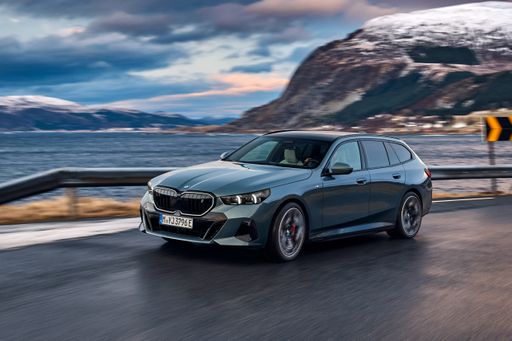
BMW i5 Touring
BMW i5 Touring
The new BMW i5 Touring combines elegant design with cutting-edge electric mobility. Its spacious interior offers both luxury and practicality, making it an ideal choice for families and long journeys. Enhanced with advanced technology, this vehicle ensures a smooth and efficient driving experience.
details @ press.bmwgroup.com
@ press.bmwgroup.com
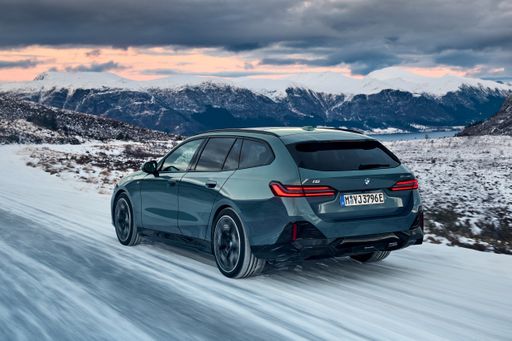 @ press.bmwgroup.com
@ press.bmwgroup.com
Kia EV9
The Kia EV9 represents a bold step forward in the automotive world with its distinctive design and futuristic appeal. This all-electric SUV promises to provide a spacious and comfortable cabin experience, making it ideal for families and long journeys. With its emphasis on sustainability and advanced technology, the EV9 aims to redefine the standards for electric vehicles in its category.
details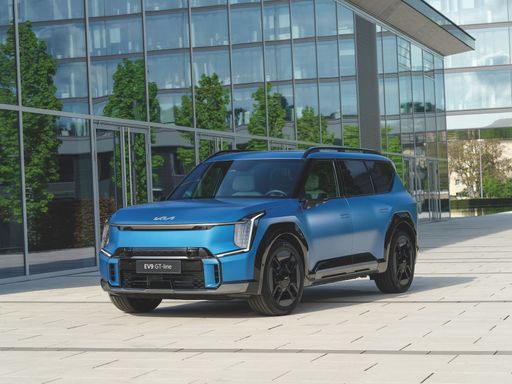 @ press.kia.com
@ press.kia.com
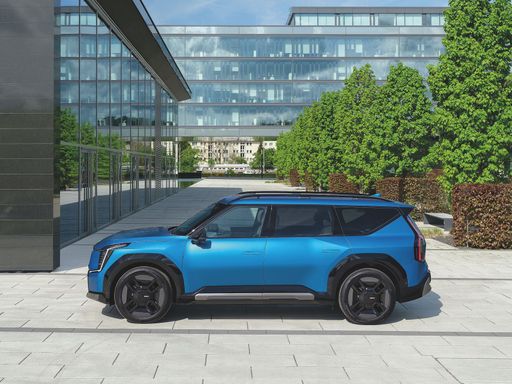 @ press.kia.com
@ press.kia.com
 @ press.kia.com
@ press.kia.com
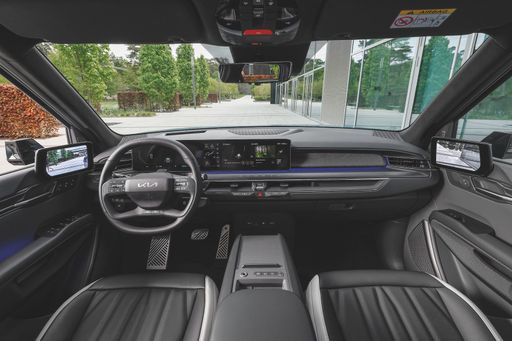 @ press.kia.com
@ press.kia.com
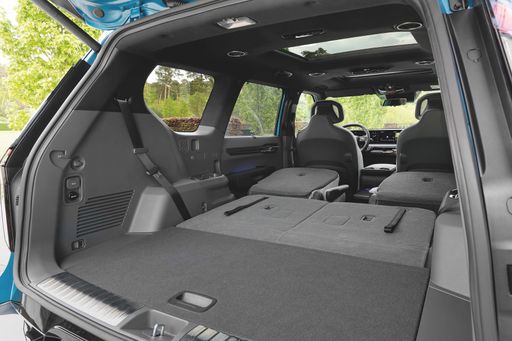 @ press.kia.com
@ press.kia.com

|

|
|
|
|
Costs and Consumption |
|
|---|---|
|
Price
61900 - 87000 £
|
Price
53100 - 78000 £
|
|
Consumption L/100km
-
|
Consumption L/100km
-
|
|
Consumption kWh/100km
15.4 - 17.7 kWh
|
Consumption kWh/100km
19.5 - 22.8 kWh
|
|
Electric Range
522 - 602 km
|
Electric Range
443 - 563 km
|
|
Battery Capacity
81.20 kWh
|
Battery Capacity
76.1 - 99.8 kWh
|
|
co2
0 g/km
|
co2
0 g/km
|
|
Fuel tank capacity
-
|
Fuel tank capacity
-
|
Dimensions and Body |
|
|---|---|
|
Body Type
Estate
|
Body Type
SUV
|
|
Seats
5
|
Seats
6 - 7
|
|
Doors
4
|
Doors
5
|
|
Curb weight
2255 - 2425 kg
|
Curb weight
2392 - 2664 kg
|
|
Trunk capacity
570 L
|
Trunk capacity
333 L
|
|
Length
5060 mm
|
Length
5010 - 5015 mm
|
|
Width
1900 mm
|
Width
1980 mm
|
|
Height
1505 - 1515 mm
|
Height
1755 - 1780 mm
|
|
Max trunk capacity
1700 L
|
Max trunk capacity
2318 - 2393 L
|
|
Payload
535 - 560 kg
|
Payload
542 - 615 kg
|
Engine and Performance |
|
|---|---|
|
Engine Type
Electric
|
Engine Type
Electric
|
|
Transmission
Automatic
|
Transmission
Automatic
|
|
Transmission Detail
Reduction Gearbox
|
Transmission Detail
Reduction Gearbox
|
|
Drive Type
All-Wheel Drive, Rear-Wheel Drive
|
Drive Type
All-Wheel Drive, Rear-Wheel Drive
|
|
Power HP
340 - 601 HP
|
Power HP
204 - 508 HP
|
|
Acceleration 0-100km/h
3.9 - 6.1 s
|
Acceleration 0-100km/h
4.6 - 9.4 s
|
|
Max Speed
193 - 230 km/h
|
Max Speed
185 - 220 km/h
|
|
Torque
430 - 820 Nm
|
Torque
350 - 740 Nm
|
|
Number of Cylinders
-
|
Number of Cylinders
-
|
|
Power kW
250 - 442 kW
|
Power kW
150 - 374 kW
|
|
Engine capacity
-
|
Engine capacity
-
|
General |
|
|---|---|
|
Model Year
2024
|
Model Year
2023 - 2025
|
|
CO2 Efficiency Class
A
|
CO2 Efficiency Class
A
|
|
Brand
BMW
|
Brand
Kia
|
Is the BMW i5 Touring offered with different drivetrains?
The BMW i5 Touring is offered with All-Wheel Drive or Rear-Wheel Drive.
The prices and data displayed are estimates based on German list prices and may vary by country. This information is not legally binding.
